Student loans, Pell grants will continue despite Education Department downsizing, expert says
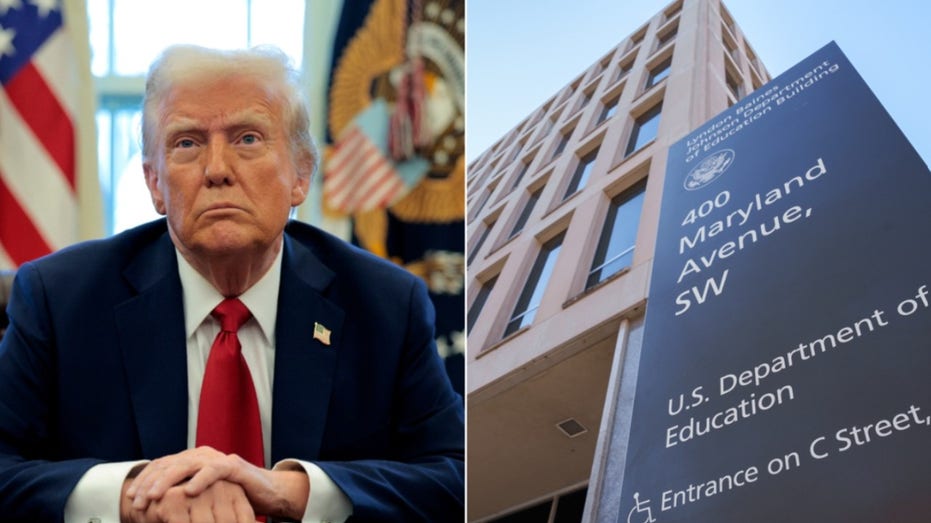
As President Donald Trump moves to downsize and eventually dismantle the Department of Education, an expert in contact with White House stakeholders assured that the department’s programs, including funding, student loans and civil rights protections, will continue. “They want to make sure, especially with things like Title I schools for disadvantaged students, and high poverty areas to civil rights protections for girls in sports, to race equality in education through Title Six will continue to be enforced through the federal Department of Education until and unless those burdens, those responsibilities, can be shifted to other departments, and that would take place by congressional action,” Sarah Parshall Perry, top legal expert at Heritage Foundation, told Fox News Digital in an interview. Trump signed a long-anticipated executive order Thursday to do away with the Education Department and directed Education Secretary Linda McMahon to initiate the shutdown process and transfer key functions, such as Pell Grants and Title I funding, to other federal agencies. DEPARTMENT OF EDUCATION SIGNIFICANTLY DISMANTLED IN NEW TRUMP EXECUTIVE ORDER Perry said Thursday’s order “is going to be the first step in a very long, consistent, labor-intensive process to be able to continue the work of downsizing.” “Which is exactly what we’ve seen the Department of Education already do, but also specifically continue enforcing civil rights and financial aid responsibility through the federal government until those particular duties are passed to other agencies,” she said. For instance, Perry said, civil rights enforcement would shift to the Department of Justice, while student loan processes would be handled by the Department of the Treasury. “They fully understand, and this is gratifying to hear that the White House has to work with Congress to offload the full responsibilities to other agencies and to ultimately unwind the Department of Education,” she added. INJUNCTION LIFTED ON TRUMP EXECUTIVE ORDERS SLASHING FEDERAL DEI SUPPORT Perry said the initial cuts so far within the agency have been narrowly focused on slashing critical race theory and diversity, equity and inclusion initiatives, in line with Trump’s other executive orders. “But the only two provisions in the executive order are taking legal steps to continue narrowing the agency’s focus and continuing to enforce civil rights and administer ongoing federal financial programs, because those duties cannot be offloaded to other agencies without shifting the burden by congressional action,” she said. Students attending college or private schools with student loans or Pell grants will continue to receive their federal funding under Trump’s order. Perry said there is “a misconception” that schools would be forced to close or raise taxes due to budget shortfalls caused by downsizing the department, but “federal taxpayer spending actually makes up less than 10% per pupil funding in the state, so the remaining amount is generally split between local and state taxpayers, not federal taxpayers.” Since its establishment in 1979, the Education Department’s budget has grown from approximately $14 billion to about $268 billion in Fiscal Year 2024, accounting for 4% of total federal spending, according to the Office of Management and Budget. Prior to the department’s creation, federal student loans were administered through the Guaranteed Student Loan Program, established in 1965 under the Higher Education Act. This program involved the federal government guaranteeing loans provided by banks and non-profit lenders to students attending eligible institutions. SCHOOL CHOICE ACTIVISTS WARN PARENTS ABOUT BLUE STATE’S HOMESCHOOL BILL WITH JAIL-TIME PROVISION Perry said the focus should be on strengthening education at the state and local levels, while ensuring continued federal oversight of student loans, civil rights laws, and Title One funding for underprivileged and low-income students. “So the federal government is always going to have a responsibility to enforce, apply and sort of interpret and send these particular protections and their financial associations,” Perry said. She suggested that these federal programs could be separated or “divested” from the Department of Education, meaning the department’s role in administering them can be reduced or transferred to other agencies. Trump’s executive order fulfills a major campaign promise, aiming to restore local control of education and back school choice amid the ongoing culture war.
Justice Department tells federal judge it might invoke state secrets act on high-profile deportation case
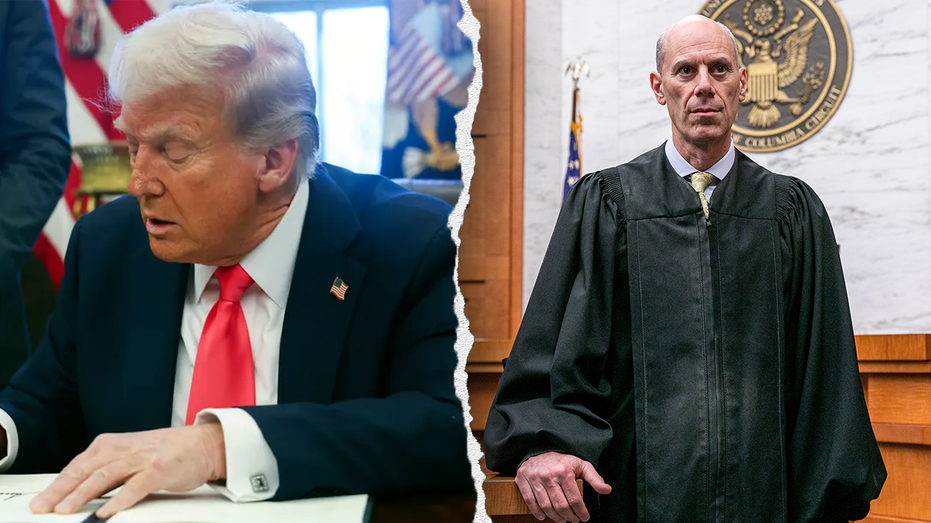
The Justice Department said Friday it is considering invoking the state secrets privilege in its ongoing court battle over the Trump administration’s deportation flights to El Salvador, a tool that could allow them to withhold certain information for national security purposes. In a declaration filed Friday morning, U.S. Deputy Attorney General Todd Blanche told U.S. District Court Judge James Boasberg that he is aware of the Cabinet-level discussions invoking state secrets privilege. Invoking that privilege “is a serious matter that requires careful consideration of national security and foreign relations, and it cannot properly be taken in just 24 hours,” Blanche said. The declaration came after Boasberg had issued a Thursday deadline for the court to file information about deportation flights that sent Venezuelan nationals to El Salvador over the weekend, around the same time he issued an emergency court order temporarily blocking the Trump administration from doing so. ‘WOEFULLY INSUFFICIENT’: US JUDGE REAMS TRUMP ADMIN FOR DAYS-LATE DEPORTATION INFO Boasberg said in a blistering order Thursday evening that the Trump administration both failed to comply with the noon deadline for information – even after he gave the administration the option to file the information under seal – and noted that the court was instead sent only a six-paragraph declaration from a regional ICE officer in Texas, who said that the Trump administration is considering invoking the “state secrets privilege” in the case. Boasberg decried that declaration as “woefully insufficient,” noting Thursday that regional ICE officers cannot be talked to inform the court of high-level Cabinet discussions and suggested someone higher up in the federal government should do so. Blanche’s filing comes just hours before government attorneys are due in court Friday afternoon to testify before Boasberg in a hearing over their motion to vacate the case. Boasberg noted in a blistering order Thursday that the government had “again evaded its obligations” in failing to submit materials he requested about the flights, even after he extended the deadline for them to do so and said they could file the materials under seal. WHO IS JAMES BOASBERG, THE US JUDGE AT THE CENTER OF TRUMP’S DEPORTATION EFFORTS? At issue is whether the government failed to comply with his emergency restraining order Saturday, which blocked the Trump administration from using a 1798 wartime law to deport Venezuelan nationals, including alleged members of the gang Tren de Aragua, for a period of 14 days. Boasberg also ordered any flights in the air to return to U.S. soil immediately. Hours later, however, a plane carrying hundreds of U.S. migrants, including Venezuelan nationals removed under the law in question, arrived in El Salvador. In the days since, government lawyers have refused to share information in court about the deportation flights, and whether the plane (or planes) of migrants knowingly departed U.S. soil after the judge ordered them not to do so, citing national security protections. Boasberg previously asked government lawyers to submit information on how many planes departed the U.S. on Saturday carrying people deported “solely on the basis” of that proclamation, how many individuals were on each plane, where the planes landed, what time each plane took off from the U.S. and from where. CLICK HERE TO GET THE FOX NEWS APP He previously warned the Trump administration of consequences this week if it were to violate his order. The Trump administration, for its part, is challenging his order in appellate court Monday. Still, at least one plane with deported migrants touched down later that evening in El Salvador. “Oopsie, too late,” Salvador President Nayib Bukele said in a post on X.
Senator Sanders targets Trump, Musk and Democrats in wide-ranging interview ahead of rally with AOC
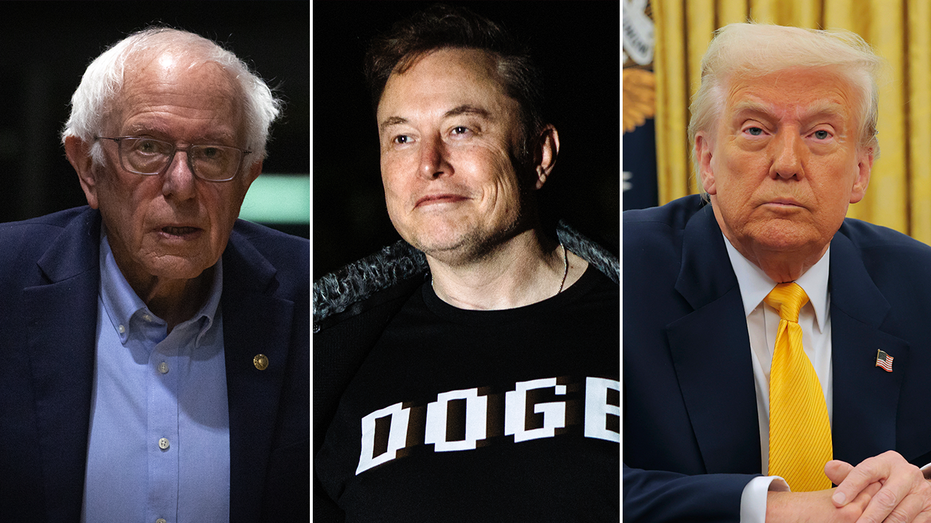
TEMPE, AZ – As he rallies against President Donald Trump, the world’s richest person and Trump ally Elon Musk, and other billionaires, Sen. Bernie Sanders is also taking aim at the Democratic Party. “I think what the American people see and what the polling suggests, and voter registration suggests is not a whole lot of faith in either party, Democrats or Republicans,” the progressive champion and longtime independent senator from Vermont, who caucuses with Senate Democrats, emphasized in a wide-ranging Fox News Digital interview. Sanders, who was pointing towards recent polling that indicated Democratic Party favorability at all-time lows, was interviewed on Thursday evening, ahead of a rally in front of over 11,000 people packed into an arena at Arizona State University, with a couple of thousand more in an overflow section outside. It was the second stop of the day for the 83-year-old Sanders and another rockstar of the left, Rep. Alexandria Ocasio-Cortez of New York, as the two politicians teamed up to kick off a three-day swing through the key western electoral states of Nevada, Arizona and Colorado as part of Sanders’ “Fighting Oligarchy” tour. FRIENDLY FIRE: AOC AND BERNIE SANDERS TAKE AIM AT DEMOCRATS AS WELL AS REPUBLICANS – ON WESTERN ROAD TRIP Sanders, who’s long railed against the influence of big money in politics as he’s pressed for campaign finance reforms, argued that Americans “perceive correctly that both political parties are dominated by big money interests.” The senator took aim at Musk, who was the largest single donor in last year’s presidential election, dishing out nearly $300 million of his own money to support Trump’s successful effort to win back the White House. “Then he’s awarded with the most important position in government. He’s essentially running the government,” Sanders said of Musk. “Does that make sense to people? It doesn’t.” But he added that “Democrats also have a whole lot of billionaires funding their campaigns. And you know, I think people are looking for alternatives. And I think, among other things, they also want to end this corrupt campaign finance system…which allows billionaires in both parties to buy elections.” CLASS DISMISSED: TRUMP TAKES AIM AT EDUCATION DEPARTMENT WITH THE STOKE OF A PEN Trump has been on a tear since returning to the White House two months ago, flexing his political muscles to expand presidential powers as he’s upended longstanding government policy and made major cuts to the federal workforce through a flurry of executive orders and actions. And Sanders and Cortez took to the stage at their first stop, in Las Vegas, Nevada, while Trump signed an executive order to begin the longstanding conservative goal of demolishing the Department of Education at a White House ceremony. Sanders charged that Trump’s move was “outrageous.” “First of all, they don’t have the power,” Sanders said. “When I talk about moving to authoritarianism, it is usurping the power of the Congress.” “If you want to get rid of the Department of Education, fine. Come to Congress and say, here’s why. This is what you want to do. You cannot do it exclusively. You cannot cut funds exclusively,” he added. Sanders claimed the “American people are sick and tired of a government now run by billionaires.” Pointing to Musk – the Tesla and SpaceX chief executive who is steering Trump’s recently created Department of Government Efficiency (DOGE), which as part of its mission to target government fraud and waste, has taken a hatchet to the federal workforce – Sanders argued, “we have the richest guy in the world going around, cutting the Veterans Administration, threatening the existence of Social Security while Republicans work on a tax bill that will give a trillion dollars in tax breaks to the richest 1% and cut Medicaid and other programs.” Minutes later, Sanders told the crowd “we have a message for Mr. Trump and that is, we will not allow you to move this country into an oligarchy.” Sanders emphasized that “we’re not going to allow you and your friend Mr. Musk and the other billionaires to wreak havoc on this country.” But the inability of Democrats in Congress, who are out of power in the White House as well as the House and Senate, to stop the majority Republicans, is causing tensions within the party amid increasing calls for leaders to come up with a stronger strategy to resist Trump. “This isn’t just about Republicans,” Ocasio-Cortez told the crowd in Arizona. “We need a Democratic Party that fights harder for us. That means each and every one of us choosing and voting for Democrats and elected officials who know how to stand for the working class…I want you to look at every level of office around and support Democrats who fight, because those are the ones who can actually win against Republicans.” The Sanders and Ocasio-Cortez western road trip comes as Senate Minority Leader Chuck Schumer, the top Democrat in the chamber, is facing increasing fire from his own party for his support last week for a Republican-crafted federal funding bill that averted a government shutdown. WHAT THIS PROGRESSIVE LEADER TOLD FOX NEWS ABOUT CHUCK SCHUMER Neither Ocasio-Cortez nor Sanders mentioned Schumer during their speeches in Las Vegas or Tempe. And Sanders, an independent who has long caucused with the Democrats and who is part of Schumer’s leadership team in the Senate, declined in the Fox News Digtal interview to answer whether he agreed with calls for Schumer to step down from his leadership position. “That’s kind of inside the Beltway stuff,” Sanders said. Asked a second time about Schumer, Sanders replied, “that’s not what we’re here for.” But it was on the minds of some of those attending the rally. Cindy Garman and Pat Robinson, both of Prescott, Arizona, told Fox News that they were “really disappointed” with Schumer’s move. And Amanda Ratloff of Gilbert, Arizona, said Schumer “is not the leader we need right now. We need somebody that will actually fight back and fight for the American people
‘Are bhai, nazar mein hi aatankwadi hain toh…’: Amit Shah’s ‘Kaala Chashma’ jibe at Rahul Gandhi
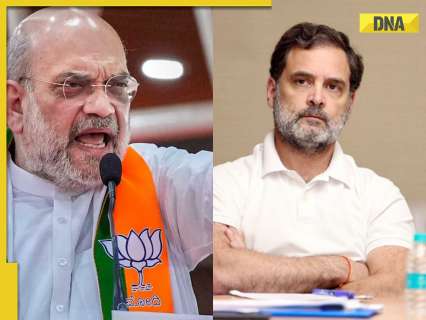
Union Home Minister Amit Shah on Friday in a sharp jibe at Congress leader and Leader of Opposition in Lok Sabha Rahul Gandhi while speaking in the Rajya Sabha on counter-terrorism operations and development in Jammu and Kashmir.
DOGE Madness: ‘Sweet 16’ bracket set up as craziest federal waste competes for championship

EXCLUSIVE: Department of Government Efficiency (DOGE) leaders in the Senate will be releasing an NCAA-style bracket of the craziest items of federal waste needing to be cut, as the public will be able to actively vote for their picks in successive Elite Eight and Final Four rounds. Sen. Joni Ernst, R-Iowa, the leader of the upper chamber’s DOGE caucus, told Fox News Digital on Friday that while college basketball’s March Madness only lasts a month, the federal government’s “spending madness” is a year-round, debt-defying event. “The Senate DOGE Caucus is dividing and conquering to bring waste to a squealing halt,” Ernst said. “This March, we will be scoring buckets for taxpayers by increasing transparency, stopping the silly spending, and making government actually start to work for the American people it serves.” Sixteen “seeds” of waste will be posted in a bracket and put up for public polling on X to determine which eight waste items are bad enough to advance; followed by the next-worst four, and championship two. DOGE CAUCUS SENATOR PUSHES FOR END TO SLUSH FUND FOR PRESIDENTIAL CANDIDATES Each DOGE caucus member received or picked priority waste items for the tournament. While there may not be any major upsets, like Lehigh University’s 2012 win over #1-seed Duke, each item’s introduction to the public may cause the same surprise. Sen. Cyntha Lummis, R-Wyo., has her spot on the bracket represented by a Biden administration appropriation of $4.5 million to “combat disinformation” in Kazakhstan. Sen. Tommy Tuberville, R-Ala., who coached Auburn’s football team for many years, will be represented in the tourney by an allocation of $168,000 for an “Anthony Fauci Exhibit” at the National Institutes of Health Museum in Maryland. A $7.9 million expenditure on teaching journalists in Sri Lanka to avoid “binary-gendered language” will be in the bracket under Sen. John Kennedy’s, R-La., name. Sen. Pete Ricketts, R-Neb., picked a $45 million Diversity, Equity, and Inclusion (DEI) scholarship program for Burmese people to be featured at the event. DRAIN THE SWAMP ACT SEEKS TO MOVE DC BUREAUCRACY OUT OF CRAZYTOWN, DOGE LEADER SAYS Ernst, meanwhile, will be represented by the $4 million that the Departments of Agriculture and Interior spent on setting up a farming infrastructure for insect-based food consumption for humans. Some of the other DOGE Madness bracket “teams” include billions in costs associated with the ATF illegally miscategorizing bureau employees as “law enforcement” (Sen. Charles Grassley, R-Iowa), $690,000 to study cannabis use among “sexual-minority gender-diverse individuals” (Sen. Eric Schmitt, R-Mo.), $12 million for a Las Vegas pickleball facility (Sen. Steve Daines, R-Mont.) and $1.75 million for MoMA – a New York City museum with already $5 billion in assets (Sen. Mike Lee, R-Utah). Additionally, Sen. James Lankford’s, R-Okla., waste bracket includes $2 billion sent to the Taliban since the Biden administration’s 2021 withdrawal. Sen. Rick Scott, R-Fla., is represented by a six-figure line item for vegetable gardens in El Salvador, and Sen. Katie Britt, R-Ala., has a $1.3 million subsidy for equity and advocacy for Long Island transgender “youth of color.” Meanwhile, Sen. Ron Johnson’s, R-Wis., bracket position is dubbed the “liberal four corners.” Johnson is represented by a $100,000 EPA grant to a major city’s teachers’ union foundation to hold a 14-day Environmental Justice Freedom School that the DOGE caucus said touches on the quartet of climate change, teachers’ unions, indoctrinating children and paid activism. Elsewhere in the Sweet 16 bracket, Sen. Marsha Blackburn’s, R-Tenn., position is represented by a $22 billion allocation from the Department of Health and Human Services to provide free housing and vehicles for illegal immigrants – and Sen. Roger Marshall, R-Kan., sought to highlight millions in wasteful spending on gender transition procedures for U.S. service members. CLICK HERE TO GET THE FOX NEWS APP The final spot in the bracket is for $1.45 billion in FEMA funds for luxury hotels for illegals, an item called out by Sen. James Risch, R-Idaho. Risch notably introduced legislation to end the practice, called the End FEMA Benefits for Illegal Immigrants Act. Amid the tournament’s division of varying types of government waste, the Senate DOGE caucus will also announce Friday that it is divvying up “priority areas” for groups of senators to focus on. Acquisition reform, digitizing antiquated government systems, transparency efforts, restoring “‘service’ to the civil service,” fraud, non-strategic foreign aid, and cost-efficiency are all areas of study being assigned across the DOGE caucus as the legislative year heats up, Fox News Digital has learned.
Trump crackdown on transgender athletes in girls’ sports gets GOP backup in House bill
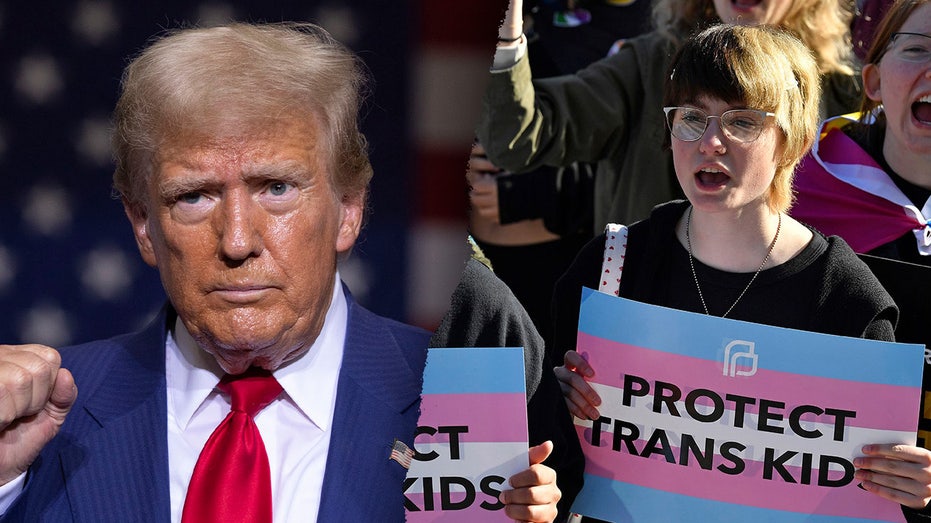
FIRST ON FOX: A House GOP lawmaker is looking to make President Donald Trump’s Title IX changes permanent. Rep. Mary Miller, R-Ill., is introducing legislation later this month to codify Trump’s executive order aimed at keeping biological males out of female-only spaces, Miller told Fox News Digital. That would include locker rooms, bathrooms, school sports teams and any other extension of academia that receives funding under Title IX federal code, by threatening that funding if schools run afoul of the prospective law. HOW TRANSGENDERISM IN SPORTS SHIFTED THE 2024 ELECTION AND IGNITED A NATIONAL COUNTERCULTURE “The innocence, privacy, and safety of young girls should never be up for debate,” Miller said in a written statement. “Any public school that refuses to follow President Trump’s orders to protect female-only spaces has no right to receive a single dime of taxpayer funding.” The bill is being circulated to other House GOP offices for possible co-sponsors and is expected to be introduced next week. It is likely to garner a significant amount of interest among Republicans, given that similar legislation by Miller introduced in the 118th Congress got sign-on from 72 House lawmakers. GOP LAWMAKER URGES TRUMP TO PULL FUNDING FOR SCHOOL ACCUSED OF MAKING GIRLS CHANGE IN FRONT OF TRANS STUDENT In the last Congress, however, her bill was aimed at reversing Biden administration-era policies expanding permissions for transgender students. With Trump back in office now, Miller is one of several House Republicans working to codify his reversals of Biden administration policies into federal law. A vote on such a bill could put moderate Democrats in a tough spot – particularly after a few left-wing figures have been heckled by the progressive left for not fully embracing medical and school sports participation for transgender youths. The legislation, previewed by Fox News Digital, is a brief two pages. It stated that “locker room facilities in active use in connection with an education program or activity may be in use only by individuals of the same sex as determined solely on each individual’s reproductive biology and genetics at birth.” “It shall be unlawful under Title IX of the Education Amendments of 1972…for an individual of one sex (as determined solely on reproductive biology and genetics at birth) to use a locker room while such room is in active use by individuals of a different sex in connection with an education program or activity,” it said.
Court order halting deportation flights ‘unconstitutionally impedes’ on executive branch, Trump allies argue

FIRST ON FOX: America First Legal (AFL) and Texas GOP Rep. Brandon Gill are supporting President Donald Trump‘s invocation of a 1798 wartime law, arguing a previous order blocking Trump’s deportation plans “unconstitutionally impedes” his presidential authority. U.S. District Judge James Boasberg came under fire this past week after blocking the Trump administration on Saturday from invoking the Alien Enemies Act (AEA) to deport Venezuelan nationals, including alleged members of the gang Tren de Aragua (TdA), for 14 days. In his order, Boasberg ordered any flights in the air to return to U.S. soil immediately. ‘WOEFULLY INSUFFICIENT’: US JUDGE REAMS TRUMP ADMIN FOR DAYS-LATE DEPORTATION INFO “This law was passed by Congress in 1798,” America First Legal Senior Counsel James Rogers said in a statement released. “Until now — for more than 226 years — courts have universally held that they do not have the power to interfere with the President’s authority as Commander in Chief to decide when to invoke the Act and expel aliens under its terms.” In its amicus filing, AFL states that Gill “believes that Tren de Aragua poses a clear and present danger to the United States,” saying he supports the president’s efforts to “neutralize this threat quickly and efficiently.” “He sees the President’s use of the Enemy Aliens Act as vital to ensuring the safety of his constituents,” the filing reads. SCOOP: IMPEACHMENT ARTICLES HIT JUDGE WHO ORDERED TRUMP TO STOP TREN DE ARAGUA DEPORTATION FLIGHTS AFL argues that the AEA “confers on the President the power to invoke the Act’s provisions in cases of invasion or predatory incursion,” saying such authority is not reviewable by the courts. The filing notes the president’s commander in chief post, as vested by the Constitution, saying that the AEA “statutorily grants the President wartime powers,” and courts cannot appropriately “second-guess” the president’s decisions and discretion over the AEA’s implementation. “At best, the Plaintiffs seek to use the federal courts to deliver a political victory,” the filing reads. “There is no dispute that the Plaintiffs are here illegally. Enjoining implementation of the TdA Proclamation unconstitutionally impedes the President’s ability to respond to national security threats.” On Thursday, Boasberg said the administration had missed a previously-set court deadline to disclose information on the deportation flights to El Salvador. Boasberg noted in an order issued that day that the government “again evaded its obligations” to submit the requested information even after he had allowed them to submit it under seal. WHO IS JAMES BOASBERG, THE US JUDGE AT THE CENTER OF TRUMP’S DEPORTATION EFFORTS? The filing they submitted hours after the deadline failed to answer his questions. Boasberg said the court had received a six-paragraph declaration from a regional ICE office director in Harlingen, Texas, that stated Cabinet secretaries are “actively considering whether to invoke the state secrets [act] privileges over the other facts requested by the Court’s order.” “This is woefully insufficient,” Boasberg said. Following Boasberg’s Saturday emergency order siding with the plaintiffs, Democracy Forward and the ACLU, Fox News Digital was first to learn that Gill had filed impeachment articles against Boasberg, saying at the time, “This is another example of a rogue judge overstepping his…authority.” “For the past several weeks, we’ve seen several rogue activist judges try to impede the president from exercising, not only the mandate voters gave him, but his democratic and constitutional authority to keep the American people safe,” Gill told Fox News Digital. CLICK HERE TO GET THE FOX NEWS APP Gill’s resolution accuses Boasberg of abusing his power in levying an emergency pause on the Trump administration’s deportation plans. The resolution text says the order “jeopardizes the safety of the nation, represents an abuse of judicial power, and is detrimental to the orderly functioning of the judiciary. Using the powers of his office, Chief Judge Boasberg has attempted to seize power from the Executive Branch and interfere with the will of the American people.” Fox News Digital’s Breanne Deppisch and Elizabeth Elkind contributed to this report.
Musk PAC steps deeper into Wisconsin Supreme Court election with $100 offer to voters
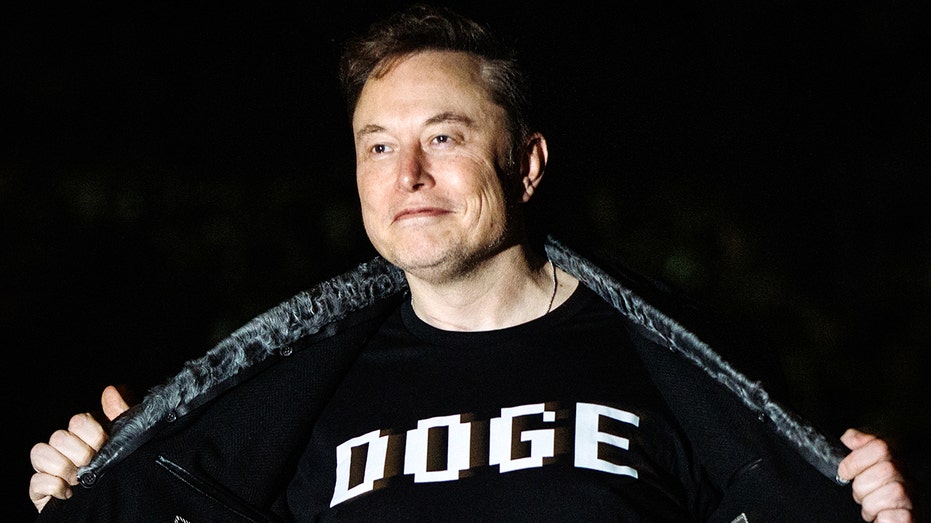
With a Wisconsin Supreme Court seat on the line in a state election, Elon Musk’s America PAC is offering registered state voters $100 to sign a petition to express “Opposition to Activist Judges.” Registered Wisconsin voters can also score $100 for referring registered state voters to sign. “Wisconsin registered voters receive $100 for signing the petition & $100 for each signer they refer,” a tweet on the PAC’s X account states. Signers must provide their name, email address, phone number, and mailing address. “Judges should interpret laws as written, not rewrite them to fit their personal or political agendas,” the petition reads. “By signing below, I’m rejecting the actions of activist judges who impose their own views and demanding a judiciary that respects its role—interpreting, not legislating.” SOROS-BACKED JUDGE DEFENDS REDUCED SENTENCE FOR REPEAT CHILD MOLESTER AT DEBATE IN STATE SUPREME COURT RACE Early voting ahead of the April 1 election is already underway in the state. While reports indicate that the Wisconsin race is technically nonpartisan, there is a clear partisan divide in the contest. The state’s former GOP attorney general, Brad Schimel, is running for the seat against Dane County Circuit Court Judge Susan Crawford, who is backed by the Democratic Party of Wisconsin. LIBERAL JUDGE RECRUITS SANCTUARY SHERIFFS WHO DEFIED ICE FOR AD TOUTING CRIME RECORD IN PIVOTAL RACE Even before the petition signing offer, America PAC had already spent millions ahead of the state’s Supreme Court contest, a filing available on the Wisconsin Campaign Finance Information System website shows. Liberal megadonor George Soros donated $1 million to the Democratic Party of Wisconsin in January, according to a filing — the Democratic Party of Wisconsin gave $2 million to Crawford’s campaign in January, according to another filing. “Very important to vote Republican for the Wisconsin Supreme Court to prevent voting fraud!” Musk tweeted in January. DON JR. CAMPAIGNS IN WI FOR GOP-BACKED SUPREME COURT CANDIDATE AS EARLY VOTING BEGINS CLICK HERE TO GET THE FOX NEWS APP The @america X account states, “PAC Founded by @ElonMusk to support candidates who champion Secure Borders, Sensible Spending, Safe Cities, Fair Justice System, Free Speech and Self-Protection.”
From Sonia Gandhi, Jaya Bachchan, to Sudha Murthy, PT Usha: Leaders across parties unite at IUML’s Iftar gathering amid Ramzan celebrations
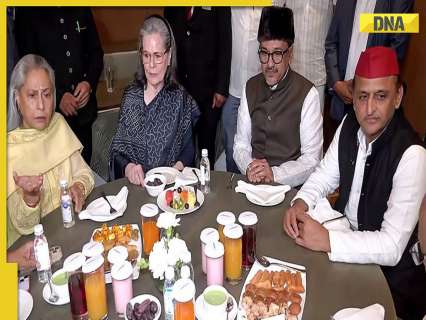
Indian Olympic Association President PT Usha who also attended the Iftar party by IUML said, “I am happy that they invited me. I am happy to celebrate with them.”
Chennai street to be renamed after this former star India cricketer

The Greater Chennai Corporation’s recent decision to rename a street in the city after the former Indian off-spinner is a fitting tribute to his achievements.

